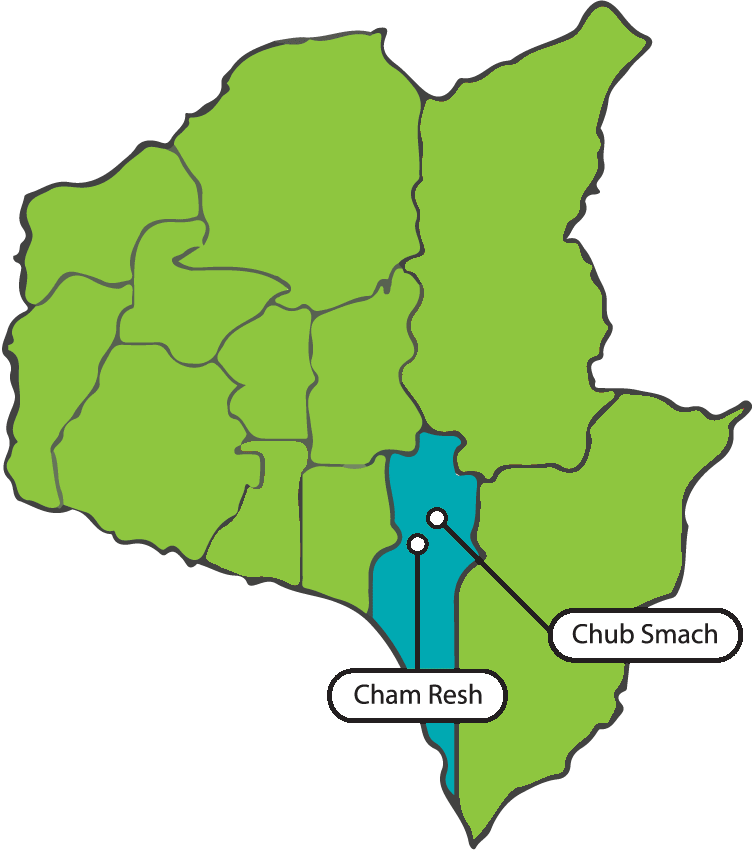
The site of BFT’s first two Four-Year Village Projects.
Cham Resh
Between 2009 and 2013, Make Every Child Count (MECC), a foundation established by Dr King Gan, provided finance to build a road to the village of Cham Resh, and create improvements there, in conjunction with BFT. Cham Resh, about 80 km east of Siem Reap City, became the first of BFT’s Four-Year Village Projects.
A holistic, “whole village” approach
The project, implemented by BFT and MECC, aimed to overcome the most pressing problems of poor diet and malnutrition, poor hygiene, and low levels of education generally. Dr Gan explains how the project started:
“I first visited Cham Resh in March 2009 with the Rural Health Team attached to the Angkor Hospital for Children in Siem Riep. The Team was conducting an education session for the villagers. The focus was on the management of diarrhoea in children. During the Q&A period, I was asked by one of the mothers to build a well for the village. The only source of drinking water was from a pond. During the dry season, the pond was shallow and dirty. It was a very moving request, one that I couldn’t refuse. I promised them a well, provided they formed a committee to look after it. Immediately, I had 11 volunteers and, shortly afterwards, thumb-print signatures to seal the contract.
But I soon realized that there needed to be a much broader approach to alleviating disease and
poverty, and so started Project Cham Resh. Project Cham Resh will serve as a model for future projects. The primary goal is to reduce the level of infant mortality. That will be done through a holistic “whole village” approach towards
• Health – clean water & sanitation
• Education – school, meal & uniform
• Alleviation of poverty – adult education
It will involve focusing on the specific needs and skills required to improve life expectancy and raise living
standards. Just part of what is needed is a constant supply of clean water, and mosquito nets for every villager. Access to medical aid is vital. That requires a road that is passable 12 months of the year. Of course, education for both the children and the adults of the village is vital for them to move forward to become a self-sustaining, healthy community. “
Source: MECC News Bulletin, Issue 1, September 2010
“Give us a road, and we’ll know how to walk out of poverty ourselves”
Cham Resh village is about 70 km from Siem Reap City and is accessed via about 20 km of unmade road, which is all but impassable during the wet season. In 2010, Alex Soh, a Singaporean photographer, said:
“My friend Dr. King Gan, a retired doctor from Australia, asked me if I could help him in saving the lives of these people in a small village, Cham Resh, 70km from Angkor Wat. I followed the benevolent doctor to Cambodia in July 2009. It was a village that was almost bare. It was the monsoon season then. I will never forget the undulating journey full of mud. Sitting on the buffalo cart because our four-wheel drive could not enter the road, the group of us endured a jolting ride of two hours. That trip will forever be imprinted in my mind. We asked the villagers if they needed any help, and if we could provide any material aid. Their reply was “Give us a road, and we’ll know how to walk out of poverty ourselves.” It was an answer full of dignity and wisdom. Simple words yet so powerful. Because of those words, I know I will be back one day.“
Source: Alex Soh, Road Photo Exhibition: A self-reflection photography journey, 2010
Chub Smach
Following the success of the first four-year project at Cham Resh, BFT launched a second four-year project at the nearby village of Chub Smach in mid-2013, to be financed by DePuy Synthes (Asia Pacific).
Proun Kimyee: a teacher’s story
“My name is Proun Kimyee. I used to live in Bong Veng but was sent by the Education Ministry to become a volunteer teacher in Chub Smach. I have been living here since 2007. I have three children, a son and two daughters.
I would like to share with you some of the problems we villagers faced about 10 years ago. When I came to this village, life was very hard. There were no roads and, whenever I went teaching on my motorbike, I always needed somebody here in this village to help lift my bike from the mud, because the road was so difficult,
There was no proper school building; there were not many students coming to study; and the school was surrounded by forest. The whole village was very quiet. There weren’t many people living here at that time.
There was no healthcare in the village. A lot of people had health problems but no access to medical help. Pregnant women delivered their babies in the village, not in hospital. Generally, people needing medical assistance were unable to receive it. The health center was difficult to reach, and people had no money to get there. Many people suffered. Some people died.
Everything has improved a lot compared to the past. I notice that everyone understands the importance of good hygiene. We can access clean water from the wells built by BFT. The people are educated about health issues are putting that knowledge to use.
The school education system today in Chub Smach is much better than in the past. In almost every house, fathers or mothers talk to their children about school, always encouraging their children to go. That is because the parents now understand that education is important to help their family and, in fact, the whole village, walk away from poverty.
I think that what has made the villagers understand the importance of education has been the adult literacy classes and other short courses conducted by BFT and the village committee. Also, BFT has provided children with school supplies, school uniforms, a school feeding program, and bicycles. All these things have greatly helped the children as well as their parents. BFT has improved the lives of all people in Chub Smach. Personally, I now have a permanent and regular income. I am also a BFT volunteer, helping implement health and feeding programs. BFT has changed my life.”

Savy Sokketh: the opportunity to get out of poverty
“My name is Svay Sokketh. I am 49 years old and have lived in Chub Smach since 2010. I live with my husband, Er Sonny. I have three children. Two daughters live with me. My son lives with his wife in another village not far from Chub Smach.
Since becoming involved with the Chub Smach project, my life has changed. My children’s health is a lot better, because they participated in the daily feeding program every morning. They are now very healthy. They have good hygiene. They are not often sick, because BFT and the village health volunteers provided health education to people in the village. Also, every two or three months, health center staff come to provide vaccinations, check on pregnant women, and teach us more about public health education. When I look back to the past before BFT, some children were not healthy. When BFT began work here, the health of the kids improved. For example, my neighbor’s children were underweight and malnourished. Once they joined the daily feeding program, they were removed from the warning list.
I am involved in the animal farming program that is part of the capacity building and micro-finance programs offered in Chub Smach. That has been a great opportunity for my family and others to develop small businesses. Since joining the program, my family and other families have been able to create sustainable businesses and become self-sufficient.
I am now running a small grocery shop and have a successful pig farm in Chub Smach. I would like to thank the donors and supporters for helping create all these things for me and other villagers here in Chub Smach. You have given us the opportunity to get out of poverty.”
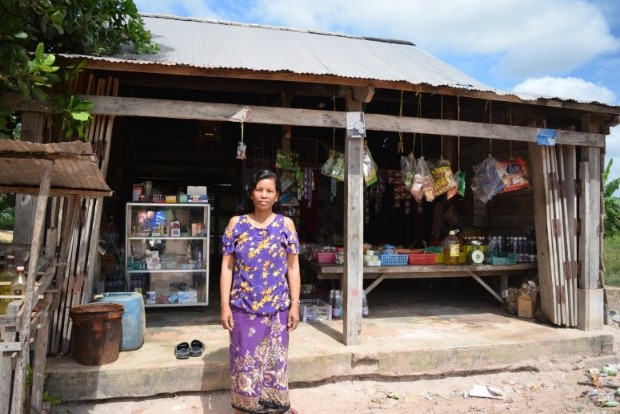
Srey Rom: a previously malnourished girl who hopes to be a doctor
Srey Rom is one of the children who participated in the malnutrition program two years ago at Chub Smach village. She, along with other children in Grade 6, was found to be underweight. In conjunction with Katrina Hayward, our Medical Program Coordinator from Australia, BFT started a program to provide enough food to eliminate malnutrition and encourage healthy growth.
Within six months, Srey Rom went from 38.2 kg to 47 kg, and grew from 1.58 meters to 1.635 meters.
Srey Rom lives with her parents, two sisters and a brother. Her parents have a small landholding on which they farm rice. After Srey Rom finished the malnutrition program, her family established a vegetable plot at home, which now provides food security.
When Srey Rom finished primary school in Chub Smach, she moved about 30 km to stay with her aunt and two cousins in Tayek district, where she is now in Grade 8, and flourishing in her studies.
She hopes that her family will be able to support her until she finishes high school and continue supporting her if she manages to attain a place to study medicine.
“I want to become a doctor,” she says, “because I have lived in a village where there was no proper healthcare. If I could become a doctor, I would help people living in the type of village I grew up, to give them the chance to have healthcare as city people do.”
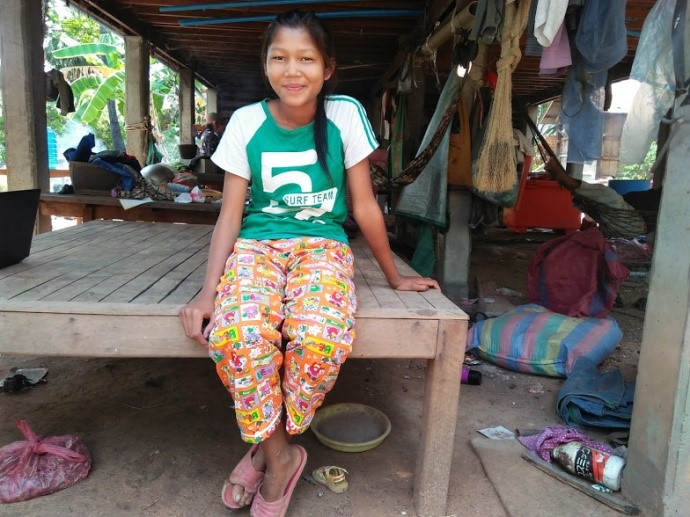
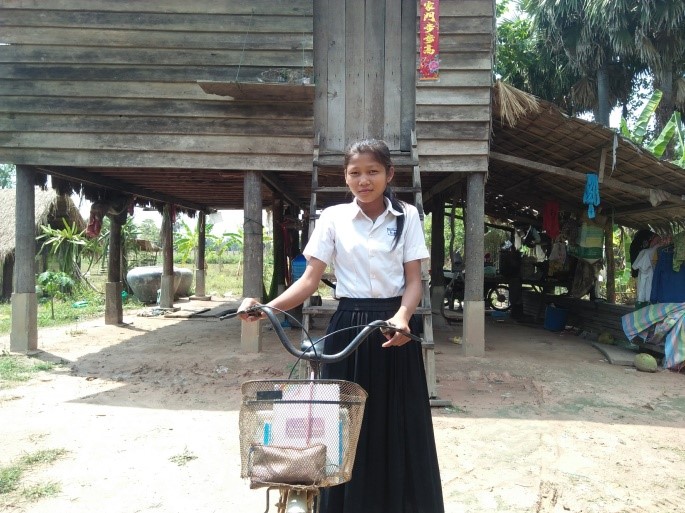
 Our Background
Our Background Our Vision, Mission & Values
Our Vision, Mission & Values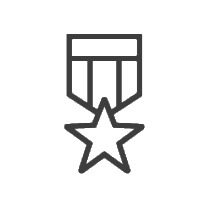 Our Achievements
Our Achievements Our Board
Our Board Where We Work
Where We Work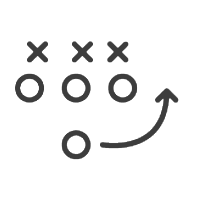 How We Work
How We Work Our Programs
Our Programs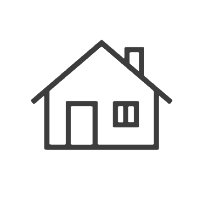 Our Villages & Stories
Our Villages & Stories Our Projects
Our Projects What’s Happening
What’s Happening Donate
Donate Volunteer
Volunteer